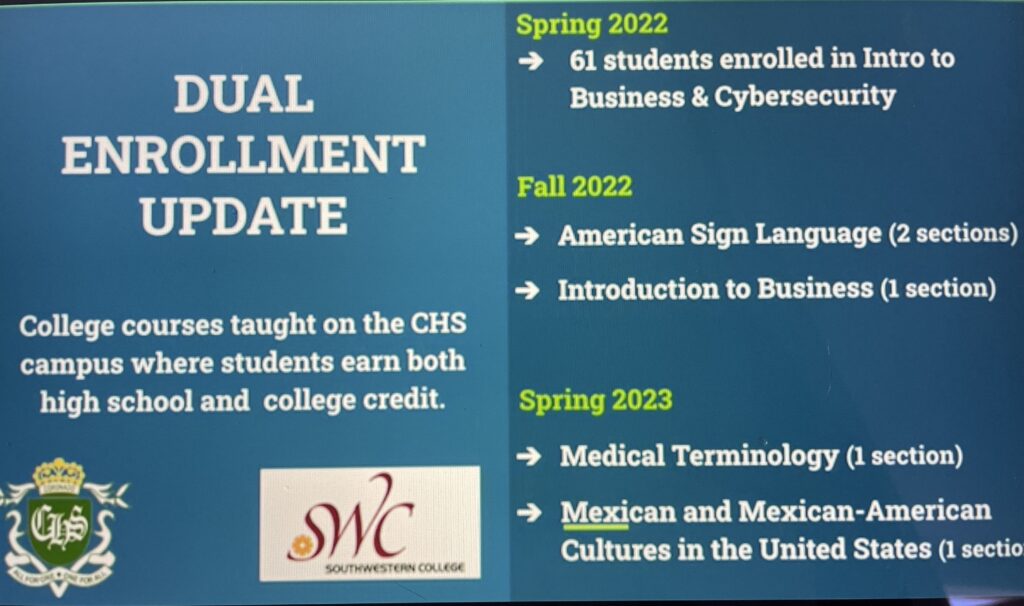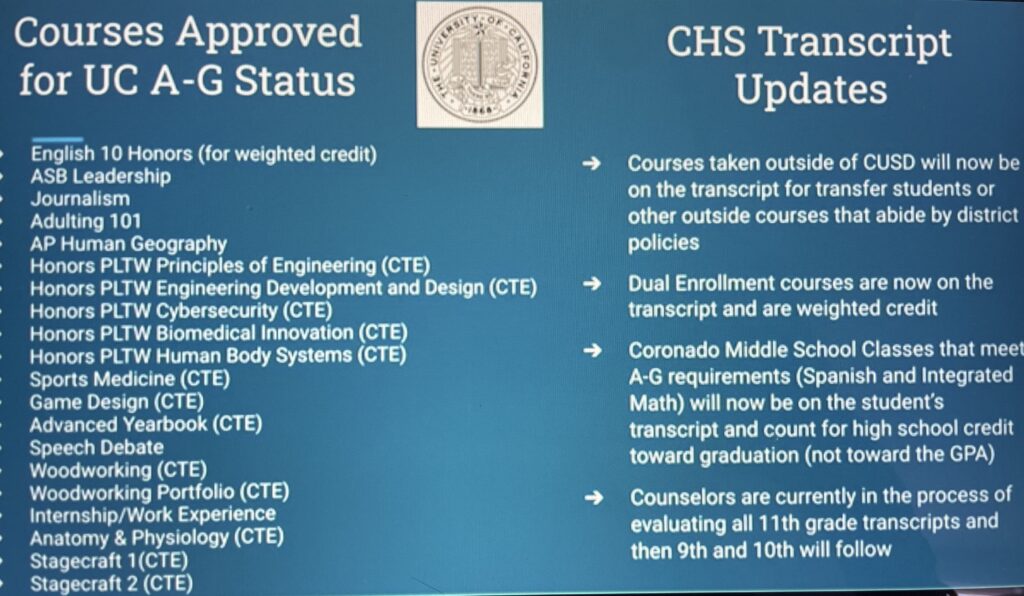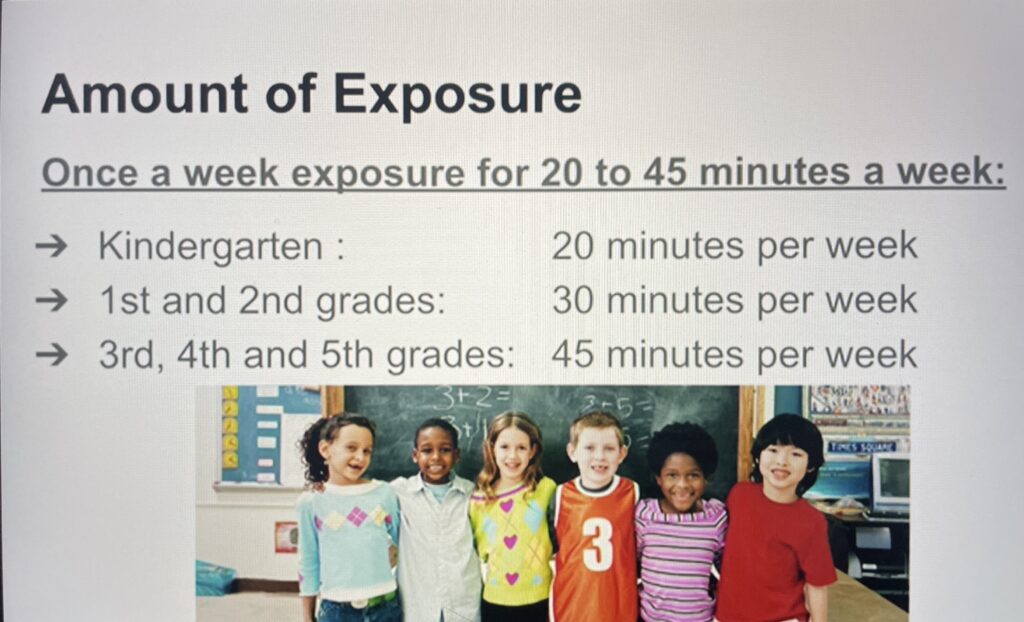The Coronado Unified School District school board trustees met on Thursday, May 19 at District Offices where Shane Schmeichel updated the members on special district-wide programs and the board approved site-specific school plans for student achievement. Superintendent Karl Mueller was absent, having recently tested positive for COVID.
The meeting opened on a celebratory note when Trustee Whitney Antrim shared that the Silver Strand Elementary Luau raised more than $30,000. She also shared that she recently represented the district at an education conference held in Washington D.C., where she had the opportunity to speak directly with Congressman Scott Peters to advocate for more federal funding. Antrim said she encouraged Peters to take action in congress to fully fund IDEA, the Individuals with Disabilities in Education Act.
“This would make a huge impact on our budget,” said Antrim. “If we can get the feds to fund IDEA more fully, then we have more money and more local control. I think we moved the needle a little bit on who we are, what we are asking for, and why.”
During public comments, community member Carolyn Rogerson encouraged the board to hold a town hall meeting to discuss the future of female athletics at CUSD.
“Some people want to define gender based on hormones, not chromosomes,” said Rogerson. “It may be a great idea to hold some town hall meetings to determine what the needs of the community are in regards to gender science and protecting girls’ sports.”
Jim Fabiszak, who is running for CUSD school board, expressed concerns over a book, Grading for Equity, that was mentioned at the April 21 board meeting. Fabiszak said that he had read the entire book, and that it attempts to toss out time-tested grading practices because of a perceived existence of implicit bias amongst teachers.
“I, for one, am not aware of any racial bias or stereotyping among CUSD teachers,” said Fabiszak. “Does this board, the superintendent or the administrators have any evidence that within CUSD this racial bias exists? If so, I request that the evidence be made immediately available to all parents.”
In a previous meeting, Director of Special Programs Shane Schmeichel had shared that, although he read the book in the process of grant acceptance, there were currently no plans to incorporate the book’s practices at CUSD. Schmeichel said the district would always look for best practices that are a good fit for Coronado residents, and Mueller shared that no changes in grading policy would take place without full board discussion and approval, as well as input from the community.
“It’s in the best interest of educators to know what’s out there,” said Dr. Helen Anderson-Cruz at the last board meeting. “They don’t have to agree, but they need to know what’s out there.”
The board also approved the School Plans for Student Achievement, which takes the district-level goals and initiatives as they relate to student achievement and applies them to each school site, according to Deputy District Superintendent Donnie Salamanca. He said that the plans were collaborative efforts from staff, students, and community members.
Antrim thanked the people from the district and community who worked hard to make the plans happen.
“These reports are detailed and are really the essence of what the community and we as a board have been asking for: data driven analysis of our academic progress,” said Antrim.
The individual plans for each site are listed in the agenda packet here.
“We’ve had some public comments tonight asking, what are we doing to improve student achievement? There’s 300 pages here, waiting to be read …please, if you have those questions, a lot of the answers can be found in this document,” said Trustee Lee Pontes. “So please, go online, and then, if you have questions, please come back and ask some more specific questions that we can answer.”
Shane Schmeichel, Director Special Programs, presented a report on the programs he oversees, including CoSA, Coronado School of the Arts. He shared that close to 500 audience members packed the house on the closing night of Mamma Mia, which was a huge success. He also shared the new logo which was selected for C-Nado, which is the homegrown school organization that works to create a positive school environment for all students.

Coronado High School Principal Karin Mellina presented an update on dual enrollment, which allows students to take classes for college credit on the CHS campus at no cost to the students. She shared that more than 61 students are currently enrolled in Business & Cybersecurity, and that classes in American Sign Language, Introduction to Business, Medical Technology and Mexican and Mexican-American Cultures in the United States would be offered in the 2022-2023 school year. She also said that CHS has at least 20 classes that are newly- A-G approved, meeting the requirements for University of California and California State campuses. In addition, CHS students are able to take advantage of concurrent enrollment, whereby they can access courses at any San Diego community college for college credit for minimal fees, according to Schmeichel.


In addition to outlining activities from choir, band, VAPA and iLab, Schmeichel shared that CoSA as well as CHS students are excited to perform the Laramie Project, playing June 2 through June 5. He also updated the board on the WeTip and LightSpeed technology that supports student safety in schools. Finally, Schmeichel introduced the district’s world language teacher, Maylen Rafuls, to share information about the K-5 rollout of the district’s Spanish program.

In his department updates, Salamanca shared that a state-mandated transitional kindergarten is on the way for 2025-2026, whereby all four-year-olds will have access to free education. It will ultimately be another grade level for all school districts in California, according to Salamanca.
Antrim asked when bus service might be returned to the Coronado Cays, which had been discontinued during COVID.
“My neighbors in the Cays have been really missing their bus service,” said Antrim. “And I know there has been some proposed legislation out that is designed to vastly increase bus service and funding for that. Do you have any insight on how that might affect us in the near future?”
Salamanca shared that there is a proposed bill to fully-fund transportation services for all K-12 schools, but that CUSD has already allocated funding to support that existing route.
“Funding is one thing … but as you know, there are staffing shortages,” said Salamanca. “I’m not sure if the state has figured out how to fully staff student-compliant buses and bus drivers.”
He said CUSD aims to restore the Cays transportation route as soon as possible, and that the district is in conversations with an entity that might work with the district. He said he would provide the board with updates as soon as he got them.
The next regular Board Meeting is set for June 9, 2022 at 4pm.




